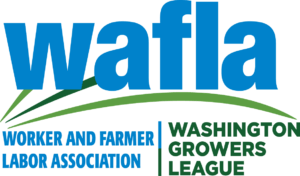Wafla Testimony on HB 2226 – Collecting H-2A Data
Wafla Testimony on HB 2226 – Collecting H-2A Data
Wafla Testimony on HB 2226 – Collecting H-2A Data
House Labor & Workplace Standards Committee
Public Hearing, January 17, 2024
Madam Chair and members of the Committee, I am Scott Dilley representing Wafla. We’re a nonprofit organization specializing in agricultural HR and the facilitation of H-2A for farmers and workers.
I am here in opposition to this bill because it is costly, duplicates work that’s already being done, and micromanages ESD’s economic research and analysis.
Section 1 is not necessary. This type of data already exists. Employer H-2A applications already include worksite and housing locations. DOL makes the information publicly available, and it’s my understanding that ESD is already conducting this type of outreach, assessment, and feedback. Last year ESD visited almost every H-2A employer and spoke to workers. If issues arise, ESD already has a program and process established to handle those issues.
Turning to Section 2, my biggest question is to what end? What purpose are these changes serving? ESD already conducts annual prevailing wage surveys of both employers and employees.
The employer survey is what is used by DOL to set prevailing wage and practice information – not the worker survey. The worker survey is only a point of comparison, but it is not officially used. So making changes to it or financing it differently only serves to satisfy proponents’ curiosity, not making any official changes.
The fiscal impacts of the bill are unclear. What are they? There will be additional costs, adding at least $50,000 plus staff time to the cost of the survey in exchange for data that not necessarily statistically significant or relevant.
The minimum numbers listed in section 2 don’t guarantee a statistically valid survey. Minimum out of how many? The population of workers may change year to year. Commodities and ag practices may change year to year. How do we know we have the proper geographic distribution of workers for the survey? It seems unwise and overbearing for statute to micromanage the survey methodology and interviews. ESD has data analysts who specialize in these matters and who can make professional judgments about such questions.
If there are suggestions about how to improve the worker survey, those can be discussed at the ASWS committee, which is the venue the legislature established for discussion and coordination among growers, workers, and state agencies.
HB 2226 increases costs and workloads for ESD, duplicates work, and offers little in return. We oppose this bill and ask you to do so, too.
